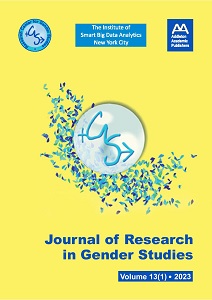Unpacking Epistemic Genderism: An Investigation on Trans Women’s Encounters with the Gender Binary within South African Knowledge Systems ‒ “What Are You Doing Here? You Are Not Supposed to Be Here!”
Unpacking Epistemic Genderism: An Investigation on Trans Women’s Encounters with the Gender Binary within South African Knowledge Systems ‒ “What Are You Doing Here? You Are Not Supposed to Be Here!”
Author(s): Siyanda B. Shabalala, Megan M. CampbellSubject(s): Gender Studies, Education, Epistemology, Gender history, Culture and social structure
Published by: Addleton Academic Publishers
Keywords: trans women; epistemic genderism; gender binary; knowledge; education; South Africa;
Summary/Abstract: Genderism, understood as a social structure that supports the notion that gender is a fixed binary of man and woman, results in the perpetuated marginalization of many trans people. Epistemic genderism describes the enactment of the gender binary in knowledge systems, in ways that uphold discrimination against gender-diverse persons. A Critical Trans Politics (CTP) framework argues that trans people’s lived experiences must be at the center of transformative efforts in educational spaces. Drawing from a CTP framework, this study explored five trans women’s experiences of epistemic genderism within South African knowledge systems, across three provinces. Participants engaged in individual telephonic interviews in 2021. Data was analysed using a Critical Narrative Approach. Three broad themes emerged: 1) Gender binary was used as a regulatory mechanism in knowledge systems; 2) An unmarked gender hierarchy existed where trans learners were constructed as problematic; and 3) Gender binary norms underpinned pedagogic practices, invisibilizing trans identities. The voices of the participants in this study disrupt, and challenge the hegemony of epistemic genderism in local South African knowledge systems. Compelling concerns about the inequitable arrangements of these education contexts emerged, with important implications for reform through educational theory (e.g., the mobilization of a theory of genderism in education), policy (e.g., challenging gendered administrative policies that exclude trans persons) and practice (e.g., providing appropriate institutional support for learners seeking to transition).
Journal: Journal of Research in Gender Studies
- Issue Year: 14/2024
- Issue No: 1
- Page Range: 34-57
- Page Count: 24
- Language: English
- Content File-PDF

